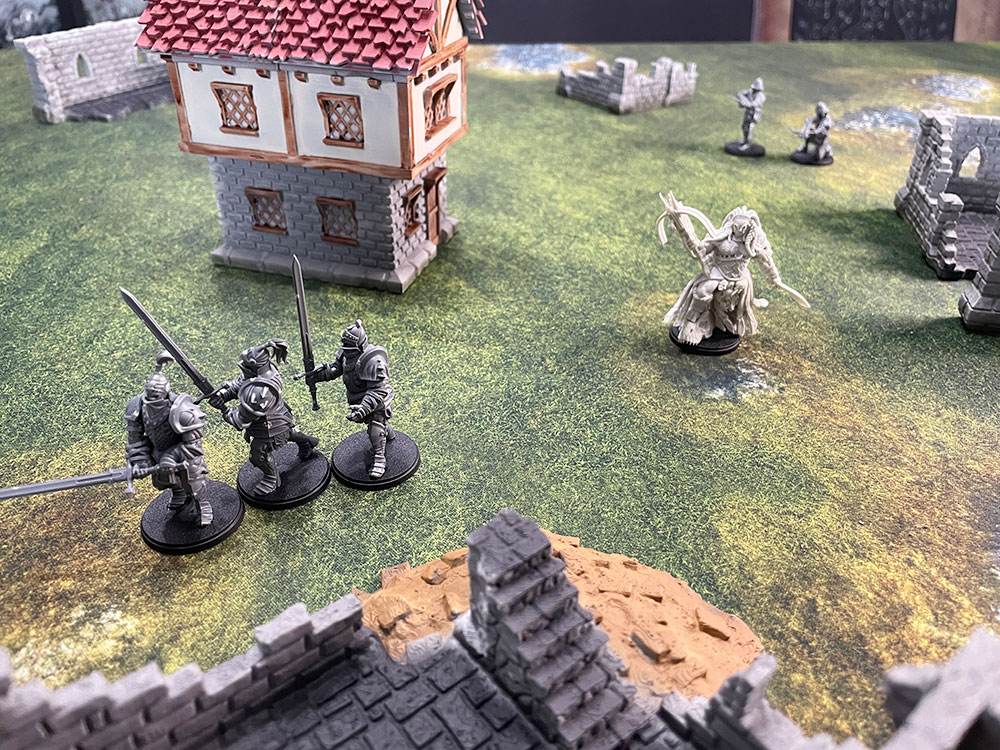 Conquest: First Blood is a miniatures skirmish game that is a variation of Conquest: Last Argument of Kings. Each game can take anywhere from 45 minutes to an hour and a half depending on the size of the forces. This is a variation of the full-scale Last Argument of Kings using the same miniatures but on a smaller more intimate scale.
Conquest: First Blood is a miniatures skirmish game that is a variation of Conquest: Last Argument of Kings. Each game can take anywhere from 45 minutes to an hour and a half depending on the size of the forces. This is a variation of the full-scale Last Argument of Kings using the same miniatures but on a smaller more intimate scale.
Gameplay Overview:
The nature of First Blood is to have smaller forces on the table with less rank and flank structure and more individual model and unit autonomy. For this review, I used the Hundred Kingdoms units versus the new Wadrhun faction.

After forces have been selected, players then start the game by rolling dice to see if any units arrive on the first turn. Each turn that passes by it becomes easier and easier to get more powerful units on the board.
After arranging what order the units will activate, the game proceeds much like the turn structure from Last Argument of Kings: each unit activates and receives two actions while players take turns activating units and trying to score points for their objective.
Some of the actions that can be taken are movement, charging, clashing, and shooting. Generally, each action can only be performed once except for moving. Each unit has its own special rules that can modify its actions and give each army its own flavor.
Players will continue the battle for about 10 rounds and then total their victory points to see who the winner is. Some of the different scenarios included in the rulebook are controlling the center objective, deathmatch, or quadrant control.

Game Experience:
The first thing I want to bring attention to is the QR codes on the cards and the army builder website. When I scanned the codes, it came up with an error message. I wasn’t sure how to use the QR codes on the unit cards until I went back to my computer and Googled how to implement them. I had to use the Conquest army builder website page to find the unit’s stats for quick reference. This was a great idea until I realized I couldn’t use the site actively on my phone and had to take screenshots of the stats to be able to flip around between them effectively. This was the biggest hurdle of getting the game set up.

Right away First Blood felt a bit more dynamic. Being able to have a smaller warband to start the game with made managing my units a little easier. My warlord/hero carried a lot of weight and felt impactful with their artifact and abilities. In Last Argument of Kings, the heroes must be embedded in a unit, while in First Blood they were out acting as their own agents on the battlefield which allowed for independent positioning instead of being hamstrung into a unit.
Movement was more fluid, and I was able to utilize cover and screening much more effectively than I could in Last Argument of Kings. With each force having ranged units, making sure cover was utilized had a massive impact on survivability. No longer were they lining up in the middle of the field to be shot down. I really preferred the models being able to move around on their own and not stuck in the rank-and-file bases.

Combat worked mostly the same with individual models being able to space out and separate damage a little easier. The battlefield didn’t evolve into a giant melee in the middle, allowing me to redirect units and make sure they were in positions a bit easier. The coherency rules were easy to understand and implement as well, helping the forces spread out. The terrain was also a major factor in battle as opposed to just sitting on the sidelines. I found my models hugging walls to get into position to charge.
The action economy felt more realistic on this smaller scale for the game and heroes were a force to be reckoned with.

Final Thoughts:
Conquest: First Blood takes the weaknesses of Last Argument of Kings and fixes most of them. Terrain played a massive role in the battles and the back and forth with my opponent felt more meaningful. Heroes were fun to play, and the game moved much faster. The biggest frustration was the use of the QR codes and not having a hard copy of the unit stats for quick reference during the different actions. With a lot of keywords, we had to keep looking up those in the rulebook already so a hard copy of unit stats along with the QR code for the digital option would go a long way. I would say that Conquest: First Blood uses the system of Last Argument of Kings to better effect and is a lot more fun on the tabletop.
Final Score: 3.5 Stars – A skirmish version of Last Argument of Kings that allows for more dynamic gameplay and faster games.
 Hits:
Hits:
• Heroes had more impact on the battle.
• Terrain made a huge difference.
• Games played faster, and interactions felt better.
• Small units made game easier to learn.
Misses:
• QR code and army building site needs a little bit of tweaking.
• Player aid cards for keywords could really help.























How does it compare to Mantic’s Kings of War?
Hey Mike, I haven’t gotten a chance to play Kings of War yet, but if I do I will definitely write a review on it!